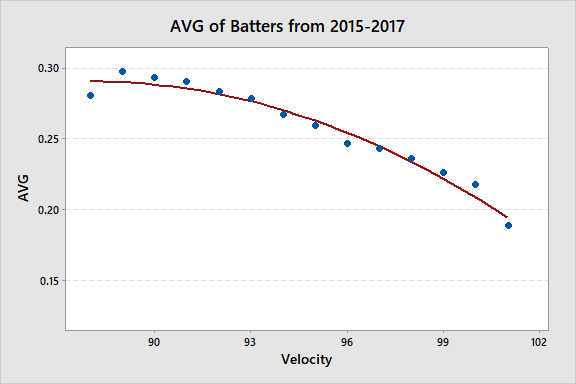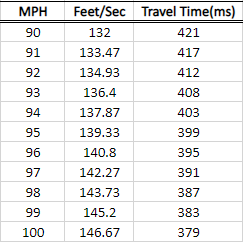Milliseconds Matter - Baseball Comparison
When you're playing competitive video games how much can a few milliseconds per frame matter? Today I'll be illustrating the importance a few milliseconds can have on your game through a comparison with the USA's favorite pastime: Baseball.
The following graph shows the difference in travel time for every mile per hour faster a pitcher throws.
(This graph assumes a 55 foot distance from the pitcher to the plate)
I specifically want to bring your attention to the following 2 values:

The following graph depicts batting compared to pitch velocity:
 Image credit: Fastball Velocity and Its Effect on Hitters
Image credit: Fastball Velocity and Its Effect on Hitters
The results are pretty staggering and illustrate the increased focus/intensity required to read a pitch and swing in 16 fewer ms. At the highest levels, when given an extra 16 milliseconds, batter's hit percentages increase by ~6% -- a >33% increase!
Additionaly 2 factors that actually give this comparison more weight:
- In PC gaming, the compound effect (new article on this subject coming soon) that occurs from losing ~16 milliseconds on every frame
- The actual decision time a baseball player uses is around 150 milliseconds... not the full 379-395 ms travel time as alluded to above.
This means that a savings of ~16 milliseconds(per frame) should actually net you a much greater accuracy increase than the 33% illustrated by the example above.
What would happen if you could gain that metaphorical 4 mph on your "pitches"? If your accuracy in Overwatch or Fortnite went up by 33%, how do you think your win percentage would be affected? What do you think would happen if you had 16 extra milliseconds to react to a peeker in Valorant or Counter-Strike?
For me, gaining a 10 ms frame advantage came from upgrading from a 60 hz monitor to a 144 hz monitor, and netted me a 20% increase in accuracy in Overwatch (from 45% per game average to 54%). That increase in accuracy drove a massive increase in converted kills (base hits) and helped me easily glide from low gold (local Tuesday night softball league - top ~35th percentile) to mid masters (minor leagues - top ~3rd percentile).
If you've already got your 144 hz monitor(or better yet, your 240 hz monitor), SysLat is your next step to checking, reducing, and monitoring your system latency to make sure that you're playing your best every time you boot up a game. Buy one today.
